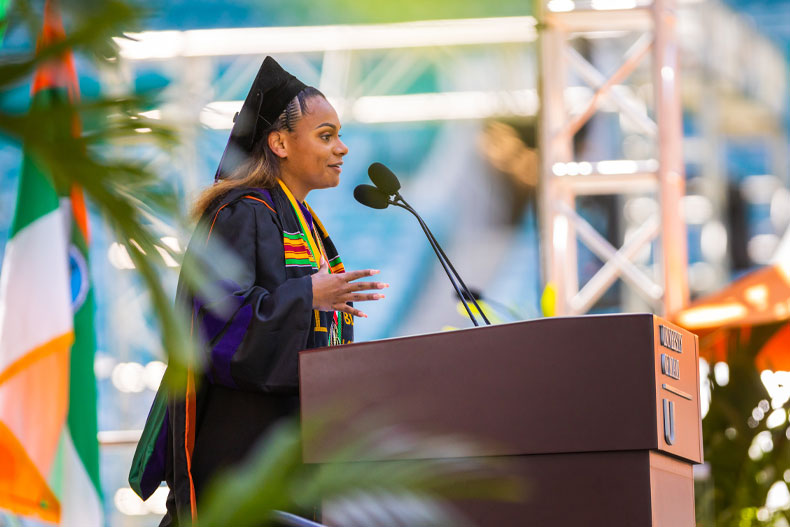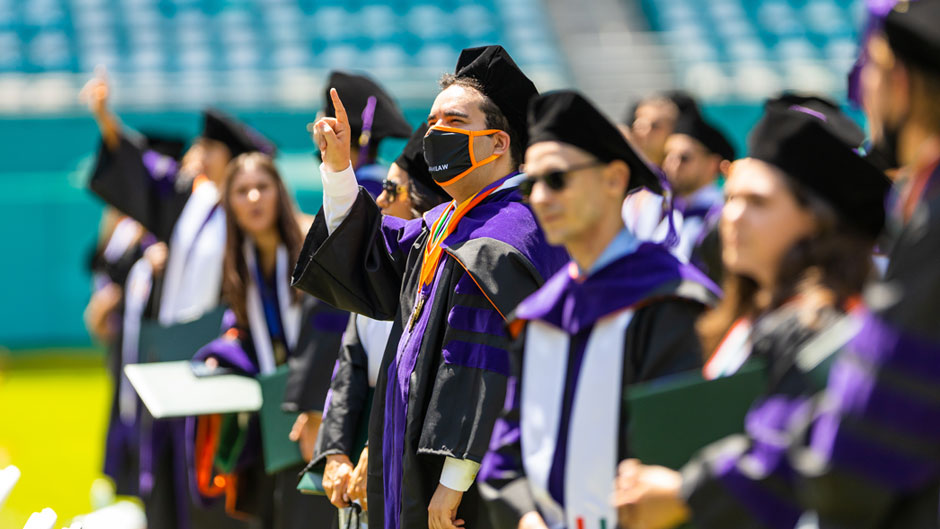Three years ago, Jordan Rhodes could not have imagined attending many of her law school classes from her living room while still dressed in her pajamas. But the COVID-19 pandemic, which has changed literally every aspect of life, forced the University of Miami School of Law student and her classmates to adapt to a new way of learning.
From taking courses that explored unprecedented and evolving legal issues to navigating court trials in solely online settings to dealing with the panic of losing Wi-Fi right before a crucial deadline, “this last year is not at all how we imagined it,” Rhodes said.

Wednesday, inside a stadium where spectators cheer the athleticism of Miami Hurricanes football players, Rhodes had her moment to bask in academic achievement. Wearing masks and sitting in chairs spaced four feet apart, she and hundreds of other students graduated from the University’s School of Law, accepting degrees that commencement speaker Laurie Silvers said will “fuel” the “rocket ship” they boarded when they started classes three years ago.
“What you feel today is more than relief at having finished something difficult,” Silvers—a School of Law alumna, philanthropist, and media entrepreneur—told the graduates. “It is the weight and the elation of joining a profession that wields great power and great responsibility.”
Special Report: 2021 Commencement
Held at Hard Rock Stadium to necessitate social distancing and to prevent any potential spread of COVID-19, the ceremony was the first of seven this week that will honor the University’s 3,842 graduates—a class of fledgling architects and engineers, musicians and nurses, scientists and entrepreneurs, lawyers and physicians—who completed a full academic year of living and learning under the shadow of the coronavirus.
During the 2020 Spring semester, the pandemic disrupted in-person learning, as students completed coursework online. But with strict protocols in place for the 2020-21 term, many students returned to campus.
And early Wednesday, with hundreds of family, friends, and guests in attendance, School of Law graduates were not only celebrated for becoming some of the nation’s newest legal eagles but also for what President Julio Frenk described as their ability to bounce back. “Living through this experience has given you the opportunity to learn and practice adaptability and resilience,” Frenk said. “No matter where your paths take you, I can guarantee you this: You will continue to use those skills. The clients and causes you serve will benefit from your ability to navigate uncertainty.”
Anthony E. Varona, School of Law dean and M. Minnette Massey Professor of Law, echoed those sentiments. “The best lawyers adjust quickly and nimbly to changing circumstances and new challenges. They help those who are less fortunate, they look out for their colleagues’ health and wellness, and they stand up against injustice and inequity in all of its forms,” he said. “The richly diverse Class of 2021 is all of these things and more. They went through a lot in this past year, persevered, and prevailed. They’re now stronger for it, and are destined for remarkable careers full of achievement, service, and meaning.”
Silvers, the incoming chair of the University’s Board of Trustees, reminded graduates that they are living in a world where knowledge that doubles every 12 hours can create a vast amount of information that can, at times, be “loud,” “distracting,” and “overwhelming.”
“But let’s face it,” she said, “for anyone who has taken half a dozen arcane 60-page legal decisions and turned them into a five-minute closing statement, sifting through the noise becomes, well, second nature.”
She described the law degree they earned as a “ticket for life,” telling them that what that life looks like from here on out is entirely up to them.
A visionary risktaker, Silvers was speaking from experience. After practicing communications law for 10 years, she ventured into the media industry, building a radio, TV, cable, and internet conglomerate. Today, she is co-CEO of Hollywood.com, the majority owner of four Florida FM radio stations, and a co-founder and an owner of the global esports organization Misfits.
But it was a moonshot idea that proved to be her signature accomplishment in the industry. Silvers and her husband, Mitchell Rubenstein, himself a successful attorney, came up with the idea of starting a basic-cable science fiction channel. But when the idea struggled just to get off the launchpad, the couple recruited two giants of the genre—Isaac Asimov, one of the “Big Three” science fiction writers of his time, and Gene Roddenberry, the creator of Star Trek—to sit on their board of advisors.
It took four years of hard work, but the Syfy Channel finally went live in September of 1992, hitting the airwaves with a prime-time presentation of Star Wars and becoming the largest basic-cable debut since Ted Turner’s TNT channel. Silvers eventually sold the channel to USA Networks, and it is now owned by NBCUniversal.
Silvers never imagined the places her journey would take her, she told the graduates, letting them in on a secret—that she knew little about online technology, science fiction, or esports when her career path shifted to the media industry.
“Changing the landscape” and “creating something new” were her goals and understanding the nature of her “entrepreneurial spirit” allowed her to succeed.
“In learning how my clients thought and why they made the decisions they made, I learned that the reason I enjoyed representing them was because I could relate to them,” Silvers explained.
A philanthropist whose generosity has funded student scholarships and an endowed professorship at the School of Law, Silvers urged the graduates not to fear failure. “History is filled with examples of tremendous successes who failed multiple times before they emerged victorious,” said the double alumna, revealing that she easily spent 50 percent of her time failing during the years it took her to develop her businesses.
“There will be moments in your lives and careers when you feel humiliated and defeated, when you are convinced you have made a very wrong turn,” Silvers said. “But I can also promise you that if you refuse to stay there, if you turn your attention from your problems to your passion, you will find your way out.”
Rhodes, president of the Student Bar Association and the student representative on the University’s Board of Trustees, reminded graduates that when her father, who is Black, and her mother, who is white, were born, interracial marriage was outlawed in 16 U.S. states.
“In reflecting on the ways in which the law has regarded members of my family in their own lifetimes, I’ve sat in many law school classrooms and wondered, ‘Where would we be if not for people challenging the law?’’’ Rhodes said. “We, Miami Law graduates, are the next generation of people that will craft and sow our communities’ future legal fabric. All of us here today are the next iteration of law interpreters, drafters, enforcers, and gatekeepers. And I challenge each of us to think about what it means to soon become the first line of defense against injustice.”
Julianna Rubin, who graduated with a joint J.D.-LL.M. degree and will join Steinberg Sports and Entertainment in an executive role after taking the Florida Bar, said the past academic year has been difficult, teaching her to reflect. “I believe this will help me not just personally, but professionally,” she said. “Working in the sport industry this past year showed just how much teams and leagues can unite the greater community. I hope taking pause and thinking about the how, will help me better serve our clients, and at the end of the day, make an impact.”
Later in the afternoon, 205 members of the Miller School of Medicine Class of 2021 received their medical degrees. Frenk and Dr. Henri Ford, dean and chief academic officer of the Miller School, congratulated the new doctors on their accomplishments. “I challenge you to practice resilience, overcome the obstacles and make a positive impact on the lives of others,” said Frenk.
Speaking to the Miller School’s 66th graduating class, Ford said, “Your skills, dedication, commitment and compassion are needed more than ever. You have a remarkable opportunity to ameliorate human suffering by providing exceptional medical care, and you are well-equipped to become transformative leaders who will shape the future of medicine.”
Dr. Lincoln Chen, president emeritus of the China Medical Board, delivered the commencement address and received an honorary doctor of science degree. After describing his personal medical journey from Bangladesh, India, and China to Harvard University and leadership of major non-governmental organizations, Chen told the graduates, “Surprises and curve balls will come at you in life. You have to be adaptable and resilient in adjusting to change.”
He added that one of the happiest times in his career was making boat trips on Bangladesh’s Meghna River to a rural health clinic, treating malnourished children with cholera and other diseases.
“For me, meaning in my professional work comes from travel and interactions with people in diverse cultures, and I encourage you to take a path based on what gives you the most passion in your professional work," Chen said. "Go out and promote health, save lives, relieve pain, alleviate suffering, and do hard work that is worth doing.”

